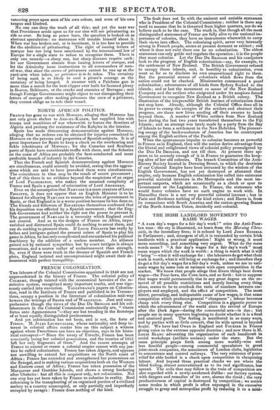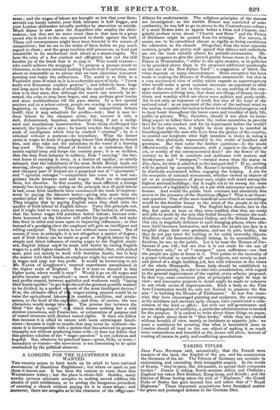THE IRISH LANDLORD MOVEMENT TO RAISE WAGES.
"A rare day's wages for a fair day's work !" cries the Anti-Poor- law man : the cry is illustrated, we learn from the Morning Chro- nicle, in the incendiary fires; it is echoed by Lord JOHN RUSSELL in Parliament ; and, strangest of all, it is resounded by certain Irish landlords with a practical application ! Right or wrong, it must mean something, and something very urgent. What do the mere words mean ? "A fair day's wages for a fair day's work" must mean wages which the work is worth : a thing is worth what it will "bring "—what it will exchange for : the labourers do get what their work is worth, what it will bring or exchange for ; and therefore they do get a fair day's wages for a fair day's work, unless we are to esti- mate wages by some rule at variance with open competition in the market. We know that people allege that divers things beat down wages—the Poor-laws, the Corn-laws, and so forth : but to suppose that wages would permanently rise in any great degree on the re- moval of all possible restrictions and merely leaving every thing alone, seems to be to overlook the ratio of numbers between em- ployers and employed, and the effect of competition. The most direct, pervading, and indisputable cause of low wages, is that same competition which produces general "cheapness"; labour becomes cheap with every thing else. Competition is a gigantic power to which the advancement of the world since the revival of Europe after the Dark Ages—during the commercial mra—is due ; but people are in many quarters beginning to doubt whether it is a final and unmixed good. The feeling js manifested in so many ways, and by parties with so little concert, that its wide spread is beyond doubt. We have had OWEN in England and FOURIER in France giving voice to the extreme opposite doctrine ; and now there is M. Louts &axe advocating the organization of each handicraft in social workshops (ateliers sociaux) under the state. But the same principle peeps forth among more worldly-wise and less fanciful people—among commercial speculators in great joint-stock companies, the associators of London clubs, legislation to concentrate and control railways. The very existence of poor- relief for able-bodied is a check upon competition in cheapening labour. And beyond these practical checks we see where the blind feeling, almost unscrutinized as to its real significance, has spread. The evils that may follow in the train of competition are also regarded with a newly-awakened dislike : our factory system, with dangers and remedies of its own, alarms the timid ; the very productiveness of capital is destroyed by competition ; we notice some trades in which profit is often expunged in the excessive Struggle to grasp and monopolize profit by reducing it to a mid. mum ; and the wages of labour are brought so low that your farm- servant can barely subsist, your Irish labourer is half beggar, and your London shirtmaker actually perishes by starvation or suicide. Much blame is cast upon the slopsellers who employ the shirt- makers ; but they are no more cruel than is that man in a great crowd who is next to the one squeezed to death against the wall. These evil consequences might have been foretold in the nature of competition ; but we are in the midst of them before we pay much regard to them ; and the great machine still presses on, as loud and irresistible in its mechanical rush ahead as a steam-engine. We hear the cries of a few crushed and affrighted, but not the still harsher jar of the break that is to stop it. Who would venture— who could achieve the stoppage ? To propose a prompt resort to Owenism, or its more rational. looking French rival Fourierism, were about as reasonable as to advise that we turn cherubim tomorrow morning and begin the millennium. The world is as little in a Fourierist state of mind as it is in a cherubic state of body. " Tantae molis erat Romanam condere gentem" ; and infinitely more huge and long must be the task of rebuilding the social world. But opi- nion is in that state, that although the march can scarcely be ar- rested, the cries to stop have begun, and may perhaps grow louder and more multitudinous till the pace abates. In a few special matters and to a minor extent, people are ceasing to compete aud beginning to cooperate. They find that competition defeats itself; that it may substitute for profits—ruin ; that it may re- duce labour to the cheapest point, but convert it into a dull, disheartened, hopeless, mechanical thing, if not a malig- nant and treacherous counteraction. Your cheap clodhopper has scarcely the brains of a man ; he barely reaches the degree in the scale of intelligence which may be marked " criminal" ; he is a criminal without a purpose—an incendiary. What the farmer saves in wages he loses in a grudging labour that delights to thwart him, and may take out the parsimony in the waste of a burning hay-yard. The cheap labour of Ireland is so turbulent, that it scares capital away and keeps the country poor ; it is so reckless, that the step from industry to robbery, from " carrying" the har- vest home to carrying it away, is a matter of caprice ; so utterly misused, that the inhabitants of the most fertile British lands are starving, always : agricultural occupations in the most characteristic and cheapest part of Ireland are a perpetual war of " ejectments " and "agrarian outrages "—competition has come to a real san- guinary battle between rent and wages. Such are oft-repeated facts, not theories. In that country, the most afflicted, a strange remedy has been begun : acting on the principle that ill-paid labour is bad, some Irish landlords have commenced the work of improve- ment by ,paying the labourer better—giving him more than the market-price for his labour—annulling the effects of competition ! They imagine that by paying English rates they shall raise the quality of Irish labour to English labour. Carry this principle out, and it might lead to very curious results. The notion is, of course, that the better wages will purchase better labour; because com- forts bestowed on the labourer will enlist his good-will, and make him freer in mind and more open to improving influences ; so that instead of a grudging slave the employer will gain an intelligent and willing coadjutor. The notion is not without some reason. But of course, if true in principle, it is not altogether a matter of degree; and if Irish labour can be made as good as English labour by the simple and direct influence of raising wages to the English stand- ard, English labour might be made still better by raising English wages to a still higher standard. It is conceivable, that, with picked men, paid not merely to work with brainless hands, but to help the master with their heads, an employer might lay out more money in wages and reap not less profit. It would be interesting to see Mr. NAPER of Loughcrew's vaunted experiment paraphrased in the higher scale of England. But if it were to succeed in that higher scale, where would it stop ? Would it go on till wages and profits became quite equalized—a mere division of employments and profits reaped, between Er pitalist and workman really "laying their heads together" to get from the soil the greatest possible amount to be divided, by a perfect c cert of the most intelligent devices ? If so, the ultimate effect of tls wages-raising process would be to raise the agricultural laboure in comfort, condition, and attain- ments, to the level of the cap alist ; and then, of course, the two characters would merge into e. The process lies between the blind "fair day's wages" crj which means nothing but a wild aimless uneasiness, and Fourierism, or cooperation of purpose and of vested interests with distinct vested rights. It does not follow that because it is allied in nature with more extravagant fanati- cisms—because it tends to results that may never be realized—be- cause it is incompatible with a system that has achieved its greatest triumphs not without producing some evils—it does not follow that this gordian solution of the "wages question" is not judicious and hopeful. But, whatever its practical issue—great, little, or none— immediate or remote—the movement is too interesting to be quite overlooked by the political observer.



























 Previous page
Previous page